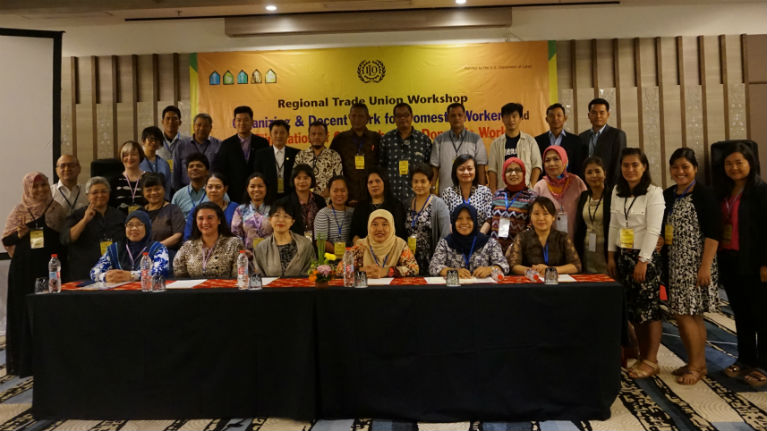Asia and Pacific
Unions intensify cooperation to promote decent work for domestic workers and eliminate child labour

The workshop “Organizing and Decent Work for Domestic Workers and Elimination of Child Labour in Domestic Work “ brought together representatives of trade unions and domestic workers ‘organizations from nine countries in the region. The main goals were to:
- Evaluate results of initiatives taken by the trade unions and domestic worker organizations in promoting decent work for domestic workers;
- Review progress made in elimination of child labour in domestic work, and
- Promote follow-up actions, including cooperation and networking among the unions for organizing, social protection and decent work for domestic workers, including child domestic workers.
“This workshop is an opportunity to review the progress and initiatives taken by unions and e governments since then and plan the way forward”, he added.
Domestic work is one of the largest sectors of informal economy in urban areas in Asian countries. It is an important source of employment for migrant workers, predominantly women and children. According to ILO findings, globally, one in every 13 female wage worker is employed in domestic work. Many international migrants involved in domestic work both within Asia and beyond originally come from developing countries in Asia. ILO estimates that 41 percent of the world’s domestic workers are in Asia, equivalent to 21.5 million people aged 15 or above and these numbers are growing in many countries in the region.
Participants presented both their immediate and longer-term priorities, highlighting the need to work together with domestic workers’ organizations in promoting recognition of domestic workers as workers. They also mentioned initiatives for organizing members and to improve decent work opportunities for domestic workers. Participants also emphasized the role of trade unions in eliminating of child labour in domestic work and the importance of strengthening regional alliances in eliminating child labour in domestic work.
Francesco d’Ovidio, Director of the ILO Country Office for Indonesia, reminded participants that despite the valuable contributions given by domestic workers to the society and families, they are still unrecognized and are often exploited, experiencing long working hours, insufficient rest periods, low wages and high exposure to abuses, harassment and violence.
“The action plans presented by the participants are in line with the mandate of the ILO’s Convention No. 189 and it is important that continue exchanging information, experiences and knowledge using the communication platform that we have developed together” he stated.
The Regional Workshop gathered around 30 participants from Cambodia, Hong Kong, India, Indonesia, Malaysia, Myanmar, the Philippines, Thailand and Viet Nam. The meeting was jointly conducted by the ILO’s Bureau for Workers Activities (ACTRAV) and the ILO Country Office in Indonesia with the support of the ILO’s Promoting Decent Work for Domestic Workers (PROMOTE) Project, funded by the United States Department of Labour (USDOL).
For more information, please contact:
Mr Arun Kumar,Senior Specialist in Workers’ Activities, ILO Regional Office for Asia and the Pacific
[Email: akumar@ilo.org ; Tel: +662.228.24.78]